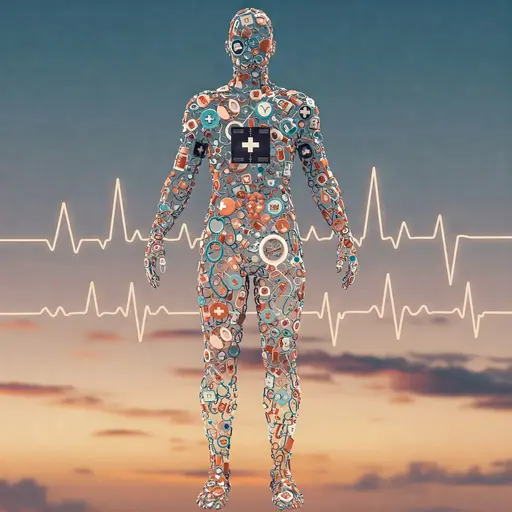In this article, you’ll discover a list of beneficial habits related to nutrition, sleep and rest, physical activity, and medical checkups. You don’t need to implement them all at once—just start introducing them gradually into your daily routine. In just a couple of months, you’ll begin to feel significantly better.
Many people believe that a healthy lifestyle means constant restrictions and discomfort. In reality, there are plenty of ways to stay healthy without making drastic changes to your life! Even if you follow just a few of them, you’ll notice a big improvement in how you feel—both physically and emotionally.

How Does Lifestyle Affect Your Health?
Many health issues require specific lifestyle adjustments. For example, patients visiting a gastroenterologist understand why fast food is off-limits, and those with respiratory conditions are likely to quit smoking after a diagnosis. Unfortunately, many of our everyday habits can make existing conditions worse. While the dangers of fatty foods, alcohol, and tobacco are well known, factors like poor sleep, constant stress, and a sedentary lifestyle often seem insignificant—but they can be just as harmful.
An unbalanced diet doesn’t just affect the digestive system—it impacts the whole body. A deficiency in even a single vitamin can lead to serious health problems. The damaging effects of alcohol and nicotine are well documented: they impair the digestive, respiratory, circulatory, and nervous systems. Lack of rest weakens the immune system, causes memory problems, reduces focus, and aggravates existing conditions.
On the bright side, people with chronic diagnoses often experience significant relief by simply adopting a healthier lifestyle. In many cases, staying healthy doesn’t require drastic changes—it’s enough to eat a well-balanced diet, get some fresh-air physical activity each day, drink more water, sleep 7–8 hours a night, and manage stress.
Healthy Lifestyle: 20 Habits and Tips to Boost Your Well-being
Healthy Eating
- Drink More Water
Adults need around 8 glasses of fluids per day, including all drinks and liquid foods like soup. However, try replacing strong tea and coffee with plain water. Start your day with a glass of water—it helps wake you up and kickstarts your digestive system. - Don’t Skip Breakfast
A hearty, balanced breakfast provides energy and focus until lunch. Coffee and a pastry won’t cut it. Opt for a mix of protein (like cottage cheese or eggs), grains, and fruits. - Rethink Your Eating Habits
Nutritionists recommend structuring meals like this: half the plate should be fresh vegetables, a quarter grains or starchy veggies, and the remaining quarter lean protein (meat, fish, eggs, or dairy). Try to eliminate sugar and heavy sauces to rediscover the natural flavor of food. Cut out sweets, fast food, and snacks—it might be tough at first, but within a week or two, the cravings will fade. - Stick to a Meal Schedule
Avoid eating at least two hours before bedtime. Try not to go more than 3–4 hours without food during the day. If you start to feel hungry, have a light snack to prevent overeating later.
Sleep and Rest
- Create a Comfortable Sleep Space
Your bed should be supportive, with a firm mattress and pillows that align your spine. Air out your bedroom in the evening. If street noise or light bothers you, use an eye mask and earplugs. - Don’t Skimp on Sleep
Adults need at least 7–8 hours of sleep each night to stay healthy. Sure, you can push through with just a few hours for a while—but eventually, it catches up to you and affects your well-being. - Switch Activities to Rest
The best kind of rest is a change of pace. If your job is physically demanding, don’t jump into housework as soon as you get home. Instead, take a warm bath, listen to music, or read a book. If you’ve been sitting at a computer all day, take a walk, do a light workout, or cook something for tomorrow. - Minimize Stress Where Possible
Stress can come from toxic people, an uncomfortable job, personal struggles, or creative blocks. If you can’t remove the source of stress, consider talking to a professional to learn how to manage your reactions in a healthy way.

Staying Physically Active
- Make Physical Activity Part of Your Routine
You don’t need intense workouts—just a brisk 30-minute walk each day can make a difference. Start by taking the stairs or getting off the bus a few stops early. A morning walk boosts energy, while an evening stroll helps you unwind and sleep better. - Add Simple Exercises to Your Day
Even short daily stretches or exercises to strengthen your back can improve your overall fitness and posture. - Maintain a Healthy Weight
Whether it’s excess weight or being underweight, both can negatively affect your musculoskeletal and cardiovascular systems. Strive to stay within a healthy range for your body type.
Healthy Habits
- Create a Daily Routine
Establishing a consistent schedule helps you better manage your time, work, and rest. With a structured day, you’re less likely to stay up late working, skip meals or workouts, or forget to give yourself a proper break. - Take Regular Stretch Breaks
The more often you get up and move, the better it is for your legs, back, and heart. Ideally, take a short walk or do a quick stretch every 20 minutes. Even standing and moving around once an hour can reduce fatigue and boost focus. - Break Free from Harmful Habits
Quitting smoking, alcohol, or other harmful substances is tough and may require professional help. But the boost to your health and well-being will be worth every effort. - Avoid Unnecessary Risks—Follow Safety Rules
Wearing a helmet when cycling or buckling up in a car may seem small, but these simple actions can prevent serious injuries. - Maintain Proper Hygiene
Wash your hands thoroughly before meals, after using the restroom, or coming in from outside. Shower daily and brush your teeth at least twice a day. These basic habits are your best defense against infectious diseases. - Take It One Step at a Time
There’s no need to adopt all these habits at once. Start small, so they become a natural part of your life without adding stress or pressure.
Medical Care and Health Checkups
- Get Regular Health Checkups
Routine screenings help catch diseases early—when they’re easiest to treat. Ideally, schedule a full checkup at least once a year. If you’re short on time for multiple appointments, consider a comprehensive diagnostic like a Total Body Scan—it takes just three hours and checks everything at once. - Don’t Ignore Discomfort
If something feels off, don’t wait for it to get worse—see a doctor. It’s hard to self-diagnose accurately, and treating yourself without guidance can actually make things worse. - Follow Medical Advice Carefully
Stick to prescribed medications, therapy sessions, and dietary or activity recommendations. If you’re unsure about the treatment plan, consult a second doctor within the same field. - Consult a Specialist Before Making Major Lifestyle Changes
Some diets or sports might not be safe for you, especially if you have allergies, digestive conditions, or chronic illnesses. If you’re uncertain about what’s best for your body, speak with your healthcare provider first.

🧠 Real Stories Behind the Habits
💧 “Water Changed My Life” — Maria, 34, Office Manager
“I used to rely on coffee all day. I felt tired, bloated, and had constant headaches. One day I read how dehydration can cause all that. I started drinking two big bottles of water a day and added a glass first thing in the morning. It felt silly at first, but within a week, I noticed a huge difference. I was more focused at work and even my skin looked better.”

🍳 “Breakfast Made Me Feel Human Again” — David, 41, Freelance Designer
“For years I skipped breakfast and thought I was saving time. I’d get cranky by 11 AM, overeat at lunch, and then crash in the afternoon. A friend suggested I try real breakfasts—eggs, oats, maybe fruit. Within days, I had more energy and fewer sugar cravings. I now actually look forward to mornings.”
😴 “Sleep Was My Missing Medicine” — Nina, 29, Teacher
“I kept getting sick, even though I ate well and worked out. Turns out, I was averaging 5 hours of sleep. I decided to take sleep seriously—bought blackout curtains, set a 10 PM phone-off rule, and committed to 8 hours. In two months, my immune system felt stronger, my skin cleared up, and my anxiety reduced.”
🚶 “Walking Helped My Mental Health” — Ben, 52, Programmer
“My job is fully remote, and I barely moved during the day. I started feeling low and foggy. I began walking 30 minutes each morning before work, rain or shine. It became my therapy. It cleared my head and gave me a rhythm I didn’t know I needed.”
💔 “A Scare That Changed My Diet” — Laura, 38, Marketing Executive
“I landed in the ER with stomach pains. Turns out, years of fast food and soda had taken a toll. The doctor told me it could’ve been much worse. That night, I threw out all my junk food. I began meal prepping, learning about clean eating, and taking small steps. I lost 15 pounds in four months and haven’t had pain since.”
🚭 “Quitting Smoking Took 3 Tries—But It Worked” — Arman, 44, Taxi Driver
“I smoked since I was 17. I tried quitting several times but always went back. Then my daughter asked me if I’d live to see her wedding. That hit hard. I got support from a counselor, used nicotine patches, and joined a support group. It’s been two years now. My breathing is better, food tastes better, and I feel proud of myself every day.”
👩⚕️ “A Checkup Saved My Life” — Caroline, 56, HR Specialist
“I wasn’t feeling bad, just tired a lot. I almost canceled my annual checkup. But something told me to go. Blood tests showed I had early-stage thyroid disease. We caught it early and started treatment right away. Now I always tell people: don’t skip your checkups. It really can save your life.”
🧘 “Stress Nearly Broke Me” — Max, 32, Startup Founder
“I worked 12-hour days, 7 days a week. I thought hustling was healthy. But one day, I fainted at the office. The doctor said I was burnt out. I had to learn boundaries, say no, and take weekends off. I added yoga and meditation to my mornings. It felt selfish at first—but now I’m sharper, more present, and actually enjoying my work again.”

